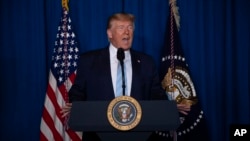U.S. President Donald Trump on Friday celebrated the death of the commander of Iran's elite Quds Force, saying the airstrike that killed the shadowy Qassem Soleimani was long overdue.
Speaking publicly for the first time since defense officials confirmed Soleimani was the target of a U.S. strike near Baghdad International Airport on Friday, Trump also warned Iran that it risked more strikes if it continued to target Americans.
"We took action last night to stop a war," Trump told reporters at his home in Mar-a-Lago, Florida. "However, the Iranian regime's aggression in the region, including the use of proxy fighters to destabilize its neighbors, must end and it must end now."
Trump blamed Soleimani for the deaths of thousands of Americans, Iraqis and Iranians, saying the longtime regime general "made the death of innocent people his sick passion" while helping to run a terror network that reached across the Middle East to Europe and the Americas.
"We take comfort in knowing his reign of terror is over," the president said, adding the U.S. had already identified additional Iranian targets.
"If Americans anywhere are threatened … I am ready and prepared to take whatever action is necessary," he said.
Troops in Kuwait
Trump’s comments came as fresh U.S. troops were setting up in Kuwait, part of Washington's plan to protect bases and personnel across the Middle East in anticipation of Iranian-directed violence.
About 750 soldiers from the 82nd Airborne Division's Immediate Response Force touched down at Salem Air Base on Friday, with U.S. defense officials confirming the force's remaining 3,000 troops were on their way.
A Defense Department spokesperson called the order for the additional soldiers "an appropriate and precautionary action," citing "increased threat levels against U.S. personnel and facilities."
Defense Secretary Mark Esper said the 3,000 soldiers had been put on notice earlier in the week, telling reporters Thursday that the Pentagon would deploy more forces "as needed."
The deployment came as Iranian officials and Iranian-backed militias in Iraq amplified their calls for revenge after the U.S. airstrike that killed Soleimani.
Iraqi officials said the U.S. strike also killed Abu Mahdi al-Muhandis, the deputy commander of Iranian-backed Iraqi militias, known as the Popular Mobilization Forces.
Harsh response pledged
Iranian Supreme Leader Ayatollah Ali Khamenei called Friday for three days of national mourning and promised a harsh response.
"All enemies should know that the jihad of resistance will continue with a doubled motivation, and a definite victory awaits the fighters in the holy war," he said in a statement carried on Iranian television.
Iranian Foreign Minister Mohammad Javad Zarif labeled the U.S. strike an "act of terrorism".
Meanwhile, Kataeb Hezbollah, the Iranian-backed militia that sparked the recent escalation with a rocket attack on a military base in Kirkuk, Iraq, that killed an American contractor, warned the U.S. "will pay a heavy price."
"Grave consequences will be borne by America, the Zionist entity, and the kingdoms of evil," the militia said in a statement translated by the SITE Intelligence Group. "Are they unaware that we will become a thousand Soleimanis and a thousand Abu Mahdis?"
How or when Iran might respond to the strike was unknown. U.S. defense and intelligence officials have long warned about Iran's penchant for using asymmetric techniques, like terrorism and cyberattacks, to target the U.S. and Western nations.
'Asymmetric strikes'
"What we are very likely looking at is a series of tit-for-tat escalations and asymmetric strikes that probably won't be limited to Iraq or to the Middle East," Kirsten Fontenrose, director of the Scowcroft Middle East Security Initiative at the Atlantic Council, told VOA via Skype.
"Iran isn't opposed to kind of hitting us in the belly," Fontenrose added. "And I think it will mean a little bit of vulnerability at our embassies and for our diplomats who live on the economies and countries where they are posted."
The United States has about 5,000 troops in Iraq and another 55,000 across the Middle East, all of whom could be targeted by Iran.
The U.S. Embassy in Baghdad told Americans Friday to "depart Iraq immediately" because of the heightened tensions.
Earlier Friday, U.S. Secretary of State Mike Pompeo told CNN that Iran and Soleimani had given Washington little choice.
"He was actively plotting in the region to take actions — a big action, as he described it — that would have put dozens if not hundreds of American lives at risk," Pompeo said of the Quds Force commander. "We know it was imminent."
Pompeo on Friday phoned British Foreign Secretary Dominic Raab and German Foreign Minister Heiko Maas to discuss the "defensive action to eliminate" Soleimani, and he thanked them for their "recent statements" recognizing the continuing aggressive threat from Iran and its Quds Force. The secretary of state also spoke with Afghan President Ashraf Ghani and Pakistani Chief of Staff General Qamar Javed Bajwa on Friday.
Cities on alert
Some U.S. cities have also heightened their alert status, concerned that Iran could use its ties with terror groups like the Lebanese-based Hezbollah in an attempt to strike the U.S. homeland.
"We have never confronted in recent decades the reality of a war with a government of a large country with an international terror network at its behest," New York City Mayor Bill de Blasio said Friday. "New Yorkers deserve to know that we have entered into a different reality."
But Chad Wolf, acting secretary of the U.S. Department of Homeland Security, said in a statement Friday, "there are currently no specific, credible threats."
Although Iran's Revolutionary Guards Corps (IRGC) and Quds Force are part of the Iranian military, the U.S. State Department designated them as Foreign Terrorist Organizations this past April because of their ties with Middle Eastern terror groups like Hezbollah and Hamas.
The U.S. also blames the IRGC and Quds Force for the deaths of more than 600 U.S. service members in Iraq between 2003 and 2011. Jesusemen Oni contributed to this report.




